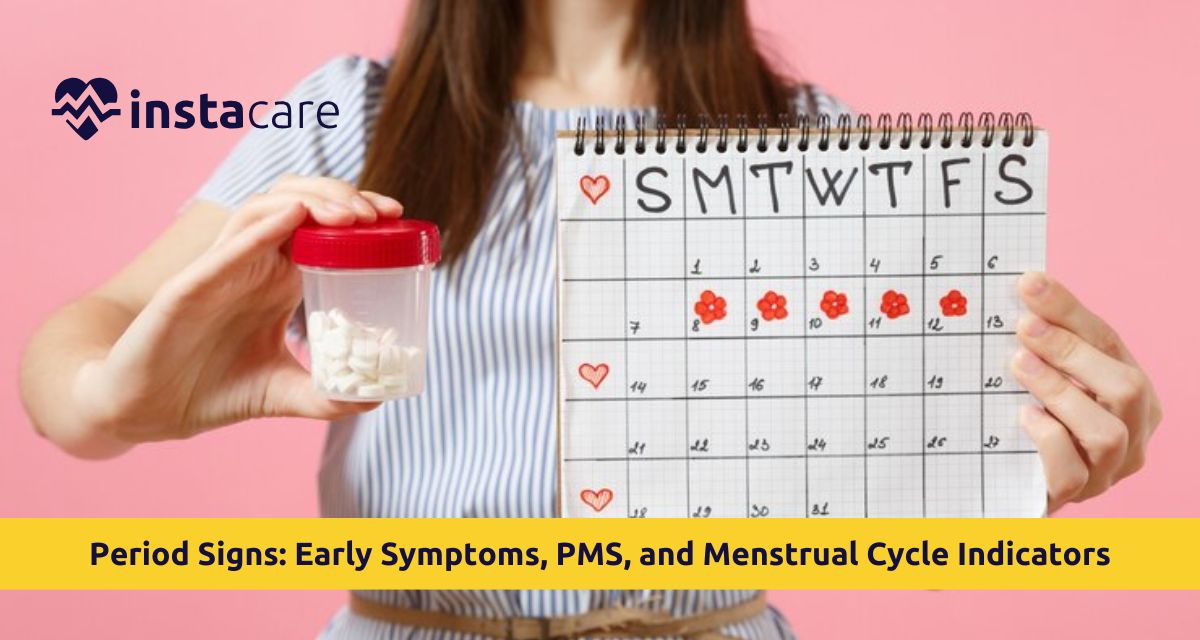What is Period Sign?
Period signs are the normal warning signs that your period is imminent. They are also known as premenstrual symptoms or PMS symptoms and may come days or even weeks before the bleeding of your period. Menstrual period signs will slightly affect some people, such as mild bloating or breast tenderness, while others will have more evident ones with body and emotional symptoms.
Learning About the Menstrual Cycle
Menstrual cycle refers to a series of physical and hormonal changes that read the body for possible pregnancy. Normal cycle lasts for 28 days but, in regular women, can last anywhere between 21 to 35 days. Menstrual cycle has four phases:
- Menstrual Phase: Blood is lost, and the cycle begins.
- Follicular Phase: The body gets ready for release of egg.
- Ovulation Phase: The egg is released from the ovary.
- Luteal Phase: The body prepares the uterus for possible implantation.
It's during the luteal phase, in about 1–2 weeks before your period, that early signs of period and
menstrual cycle symptoms begin. These are all caused by hormones dropping, which will make everything from your stomach to your mood go haywire.
Tracked through an app or calendar, your cycle will allow you to anticipate early menstrual signs that your period is approaching, and thus schedule and track your symptoms more effectively.
Early Body Signs That Come Before Period
Body period signs are strongest. They are subtle or more invasive, and while they are an experience shared by all women, strength varies from woman to woman.
The typical initial signs your period is coming are:
- Bloating: Your body retains water as a result of the hormonal change, making your body heavy or bloated.
- Breast tenderness: The change in hormones makes your breasts tender, full, or sensitive.
- Cramps: Pain in the lower abdominal area caused by uterine contractions.
- Skin changes: Acne or acne typically occurs because the skin produces more oil as a result of the triggers.
- Changes in hunger: They will develop craving for salt, sweets, or carbohydrates.
- Migraines or headaches: Due to a shift in the estrogen level.
- Fatigue: It is low before menstruation.
Premenstrual signs can be mild in one woman but extreme in another. If your symptoms significantly disturb your life, you could develop more than usual common period signs, including PMDD (Premenstrual Dysphoric Disorder).
Changes in Emotional & Mental Health
Emotional signs of period are as crucial to note as physical signs of period. Progesterone and estrogen hormones exert influence over neurotransmitters like serotonin, which exert influence over mood as well.
Most common emotional period symptoms:
- Irritability: Condition to become enraged or irritated.
- Mood swings: Sudden change in mood from happy to sad or peaceful to infuriated.
- Anxiety: Restless or restless.
- Low mood or sadness: Not easily differentiated from mild depression.
- Difficulty concentrating: Trouble staying concentrated on work, school, or conversation.
These mental and emotional changes are among the characteristics of the menstrual cycle in most women. Being able to identify them as separate from psychological illness and with no relation to them is what acquiring these cycles enables you to do.
Other Common Symptoms of PMS
Aside from commonly known cramping and mood changes, typical menstrual symptoms also comprise:
- Backache – Pain in lower back.
- Digestive changes – Endocrine impact that causes diarrhea or constipation.
- Sleep disruption – Difficulty sleeping or remaining asleep.
- Body ache or muscle/joint pain – Painful body.
- Hand or foot swelling – Water retention.
It's amazing how pregnancy vs period symptoms can be so similar. Fatigue, breast tenderness, and mood changes all happen with both, are signs of period starting. But pregnancy involves symptoms such as nausea, amenorrhea, and constantly having to pee.
How to Deal with Early Period Symptoms?
Weather of early period symptoms or body changes that occur reminiscences that can be used practically to maximize comfort and improve quality of life. Some of these tips are:
- Exercise daily: Exercise improves blood flow, gets rid of all puffiness, and averts cramping.
- Healthy dieting: Incorporate whole grains, lean proteins, and vegetables with minimized salt and sugar intake.
- Drink lots of water: Adequate water intake helps rid the body of water retention and headaches.
- Heat therapy: Using a warm washcloth or heating pad application across the lower abdomen helps relax uterine muscle tissues and prevent cramps.
- Relaxation skills: Such as taking yoga classes, meditating, or practicing deep breathing, can significantly reduce tension or both physically and emotionally.
- Restful sleep: Try sleeping at least 7-8 good hours.
- Supplements: Magnesium and vitamin B6 help reduce PMS symptoms (visit a doctor before using any supplement).
- Monitoring your cycle: A symptom calendar will help identify those typical symptoms that accompany your period, making anticipating symptoms possible and being prepared.
Precautions reduce the pain felt from symptoms associated with the menstrual cycle; it makes one feel in control.
Know When to Go to a Doctor
The majority of early menstrual symptoms are not dangerous but may be signs of an illness. Talk to your doctor about the following if you notice:
- Too much bleeding or clots.
- Severe cramping that medication cannot alleviate.
- Severe PMS symptoms that affect work, school, or relationships.
- Abrupt cycle length, number, or frequency changes.
- No conception for three or more months.
Fibroids,
endometriosis, thyroid disease, or endocrine disorder may cause symptoms that mimic normal signs of menstruation but are illness and treatable.
Conclusion
Identification of the cyclic warning signs, physically like cramping and bloating, or emotionally like irritability and mood shifts, earlier on is the most critical component of self-care. Features of the menstrual cycle are a byproduct of endocrine change during the luteal phase and are normal to reproductive physiology.
By tracking your cycle, being in health habit, signs your period is late, and knowing period vs pregnancy symptoms difference, you can plan beforehand and address the symptoms appropriately. If your premenstrual symptoms are chronic or severe, then visit a doctor to find out if there is any medical reason behind it. Your body is speaking to you each month, tune into these period symptoms so that you can care for and support yourself.
Please book an appointment with the
Best Gynecologist in Lahore, Karachi, Islamabad, and all major cities of Pakistan through
InstaCare, or call our helpline at 03171777509 to find a verified doctor for your disease.












